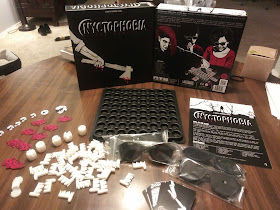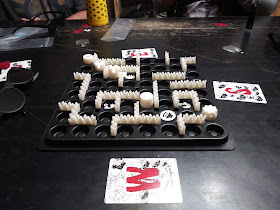Apparently, Target wanted an exclusive edition of the game, so if you buy a copy in one of their stores, you get the Vampire Encounter edition, which has some different art and slightly altered mechanics. In reading the forums on Board Game Geek, it would seem that Target's desire for a different version also stemmed from an interest in having a slightly less stalker-y game, and they felt that vampires were a little less terrifying and gruesome than an axe murderer.
In any case, let's take a look at the numbers for this innovate game:
Strategy: 2
Randomness: 1
Complexity: 1
Humour: None
Attractiveness: Average *
Average Length of Game Play: 40 minutes
Gamer Profile Ratings:
Strategy: Low
Conflict: Medium
Social Manipulation: Medium
Fantasy: Medium
An Overview of Nyctophobia
It was just supposed to be a simple trip to the lake with some friends. Now you're lost in the forest as some crazed axe-murderer chases you through the darkness. There's no moon, no starlight, and you can't see anything, so you don't even know how to find the car. If only you could get back to the car! You'd be able to honk the horn and turn the lights on to escape! But this maniac is stalking you through the night...
In Nyctophobia (which means 'fear of the dark,' by the way), one player takes on the role of the Hunter (usually, an axe murderer, but there is a variation in which you can play a mage instead. Also, if you bought the Vampire Encounter version instead, the Hunter is a vampire rather than an axe murderer). The other players are the Hunted, trying to find the car despite not being able to see.
Each of the Hunted players wears a pair of blackout glasses. They are completely unable to see with these on. They must rely on their sense of touch to learn about the game board. With the information they gather through their fingertips and the knowledge they share with the other Hunted players, they stumble around the board until they find the car.
The Hunter is the adversary, trying to kill the players before they reach the car. But he also serves as a sort of GM, guiding the Hunted as they try to make their way through the game.
Playing the Hunted
Each Hunted player has a piece that resembles a small white plastic barrel. On each end of the piece is a shape cut out of the plastic: a slot, a triangle, a cross, or a gear. Thus, by feeling the end of the pieces, they can identify which player they are touching. They also start the game with a rock token, which can be thrown either as a weapon or to gain more information about the board. In addition, each Hunted player has two heart tokens (resembling anatomic hearts, not the symbol that usually represents health or love). These heart tokens are their injury markers; if they lose both heart tokens, they are dead.
On a Hunted player's turn, the Hunter places that player's finger on their piece. They are allowed to feel the spaces directly adjacent to their own. The board is made into a maze by the use of barriers that represent trees:
Hunted players are not allowed to feel beyond trees next to them. By telling people what they feel and what actions they are taking, the Hunted are able to start forming a mental map of the board.
On a Hunted player's turn, you must move two spaces. You can feel the board around you before and after each move. Additionally, you may take one action either before your two moves or after them. The actions include:
- Throw a rock. If you have a rock token (you start the game with one, and if you move into a space with one, you automatically pick it up), you can throw it in any direction. The Hunter will tell you how far it goes and what it hits (the edge of the board, some trees, the car, another player, or the Hunter). If it hits the Hunter, you inflict a wound.
- Hide. After moving, you may hide. You flip your piece upside down so that the slightly concave end is up (rather than the flat end that is normally on top), indicating to anyone who touches it that it is a hiding player. A player who is hiding is in most senses effectively invisible to the hunter, but is also not allowed to speak until next turn.
- Sprint. After moving, you may move an extra space. This action follows the normal rules for movement, except that you're not allowed to feel the board around you after this extra move.
- Call for Help. Once you've found the car, you may take this action to trigger the end of the game. If all Hunted players survive until your next turn, they collectively win the game.
Playing the Hunter
The Hunter's main role is to guide the Hunted players. Since they can't see, it is the Hunter's job to take their hand at the beginning of their turns and place it on their piece on the board. If they make any mistakes (such as saying 'North' when they really meant to say 'South'), the Hunter should correct them. The Hunter needs to facilitate the game for everyone as no one else can see!
After all the Hunted have taken their turn, the Hunter takes a turn as well. The exception is in a five-player game; the Hunter gets a turn between the second and third Hunted as well as after all Hunted have gone.
On the Hunter's turn, you play one of the cards in your hand. You will have two cards, which determine how you can move. Each card has a verbal component, which tells you either to tell a truth, to lie, or to taunt a Hunted player. Then it tells you how to move. Depending on the card, you might move one or two spaces, or if you have one of the few special cards, you might move three or more spaces! Sometimes these cards have you do something extra; for example, one card allows you to move towards a hiding Hunted player, essentially negating the invisibility of the hiding action. Another card allows you to remove one of the tree pieces from the board. If you're using the Mage Hunter variation, some cards allow you to switch places with a Hunted, or to rotate the board ninety degrees.
An important point to note is that most cards give you different instructions, depending on whether the noise token is on the board. Normally, the noise token is placed on the space in which a rock token most recently landed. If the Hunter lands in a space with the noise token, it is removed from the board. Generally, the Hunter must move towards the noise token if it is on the board. If not, the Hunter must move towards the nearest Hunted player.
Attacking
If at any time the Hunter is adjacent to a Hunted with no trees between them, the Hunter inflicts a wound on that player. The Hunted loses a wound token (if it is your last wound token, you are dead). If the Hunted has a rock, that player may counterattack. The rock is thrown at the Hunter, whose next movement is limited to one space. The Hunter is forced two spaces away from a counterattack. Then, whether there was a counterattack or not, the Hunted player retreats two spaces using the normal movement rules.
Winning
The Hunted players win if someone finds the car, takes the 'call for help' action, and all players survive one more round. The Hunter wins if any Hunted player is killed before the completion of the 'call for help' action.
Final Thoughts on Nyctophobia
I was super excited to try this out. The idea of playing blind was really intriguing to me. Having to rely on your touch to figure out what was around you and what options were available sounded like a fascinating and enjoyable challenge.
As I'm the only one yet who has had a chance to read the rules or to play more than once, I have yet to play the Hunted. I look forward to letting someone play the Hunter. But for right now, I have to rely on what other players have told me.
The biggest issue so far is that seeing your own eyes reflected back at you on the inside of your blackout glasses is deeply unsettling. Twice now, we've turned the lights off halfway through the game to reduce the amount of seeing yourself reflected in the glasses. Additionally, effectively losing your sight for the duration of the game can be a little disorientating, such that no one has yet been willing to play two games in a row.
That said, the players have enjoyed the experience, even if they weren't willing to do it again immediately.
Also, there are optional role cards, which allow the Hunted players to have special abilities. For example, you can be the Boxer, who can counterattack even if you don't have a rock. Or you can be the Track Star, who can move an extra space for free. This grants further customisation, and increases replayability.
This game definitely does not work like other games. It's more about spatial awareness, memory, and tactile acuity than strategy or skill. That said, it is a new and unique mechanic that actually works. Often, a game will try something wildly new and different, only to find that that idea doesn't work well in practice. But this game has met with mostly positive reviews from those people with whom I've played so far.
And all that's left now is the six characteristics of a good game:
- It's fun to lose.
- It has no player elimination.
- It ends decisively.
- It relies on player agency.
- It's not overly complicated.
- It allows for upsets.
That last one (it allows for upsets) is interesting, because a Hunted player may be very close to the car and not realise it. Sometimes you might be two spaces away, and if you go east you'll find the car, but you go south instead. Other times, you might be next to the car, but there are trees between you and it. This is especially fun for the Hunter, who can see what's going on, but knows that the Hunted is completely unaware of what's happening! So it can feel like it's almost random for the Hunted to actually find the car! But that adds to the excitement, not knowing who's going to win until the game actually ends. It's anybody's game until it's actually over!
Finally, notice that I put an asterisk next to the Attractiveness rating on this game. That's because, to a certain extent, it seems wrong to judge the appearance of a game designed to simulate blindness. But in part because the game must, by its very nature, accommodate tactile sensory input, the attractiveness is both limited and irrelevant. So take this rating with a grain of salt.
So that's my review of Nyctophobia. I hope you have enjoyed reading it! I do recommend giving it a try, if for no other reason than to experience a completely new and unique game mechanic! And whatever you decide to do, I hope you always remember to



No comments:
Post a Comment
I'll be along soon to make sure your comment isn't spam. Until then, just sit tight! Unless your comment IS spam, in which case, bugger off.
Note: only a member of this blog may post a comment.